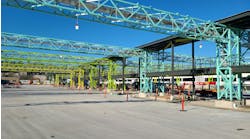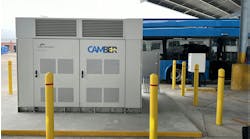New Flyer, Li-Cycle team up to complete heavy-duty lithium-ion battery recycling pilot
New Flyer has successfully completed a battery recycling pilot with Li-Cycle Corporation (Li-Cycle).
Li-Cycle offers a proprietary, closed loop lithium-ion battery resource recovery service producing minimal solid waste, and zero liquid and air emissions that can sustainably produce battery grade lithium, cobalt and nickel products. The pilot is Li-Cycle’s first program in the heavy-duty vehicle space.
New Flyer provided Li-Cycle with 45 end-of-life lithium-ion battery modules (used for research and development) totaling 3,200 pounds to be processed at Li-Cycle’s Spoke facility and turned into black mass, which is then further refined to recover critical materials such as nickel and cobalt.
“As our customers transition to zero-emission mobility, they do so with a focus on cradle to grave sustainability. The demand for battery recycling is growing, so too is the desire to lessen environmental impact on our communities. Our pilot with Li-Cycle is delivering just this and we are optimistic in offering battery recycling in the future,” said Chris Stoddart, president, New Flyer and MCI. “We’re committed to providing sustainable mobility solutions from procurement through vehicle retirement. Working with Li-Cycle delivers a triple sustainability benefit: we recover critical resources and divert them from landfills, provide them for re-use in the battery supply chain and do so through Li-Cycle’s proprietary clean recycling process that minimizes impact to surrounding environments.”
Li-Cycle’s Spoke & Hub technologies recover 95 percent of all lithium-ion battery materials – extracting high-grade materials for battery reproduction at a cost lower than mined and refined material. Key differentiators of the Spoke & Hub model include an automated process at Spoke facilities where batteries are received in any state of charge and are mechanically shredded with no sorting, dismantling, discharging or thermal processing needed. Li-Cycle Hub technology then intakes the black mass produced at Spoke plants, processes the materials hydrometallurgically and outputs high-purity battery chemicals to be redirected to the lithium-ion battery supply chain and broader economy.
Li-Cycle’s technology sets it apart from most other recycling facilities which use thermal processes to recover only a portion of the materials present in spent batteries. This approach only recaptures half the contents, as the lithium is lost, going up smokestacks and leading to further emissions. Li-Cycle’s wet-chemistry process requires lower energy consumption than traditional high temperature processes and is fully sustainable with no solid or liquid waste and zero impact air emissions.
“We are thrilled to work with New Flyer in spearheading closed-loop resource recovery of electric bus batteries. As of 2019, approximately 425,000 of the world’s buses are electric and our goal is to support the growth of electrification with solutions to end-of-life challenges associated with lithium-ion batteries,” said Kunal Phalpher, chief commercial officer, Li-Cycle. “This pilot program demonstrates how Li-Cycle is supporting the transition to sustainable transport, serving the dual purpose of reducing hazardous waste while recovering critical materials so they can be reintroduced into the supply chain. We are excited to work with New Flyer in closing the loop for electric bus products.”
New Flyer and Li-Cycle are both members of CALSTART, an international nonprofit dedicated to accelerating the pace of clean technology and the adoption of clean transportation.

